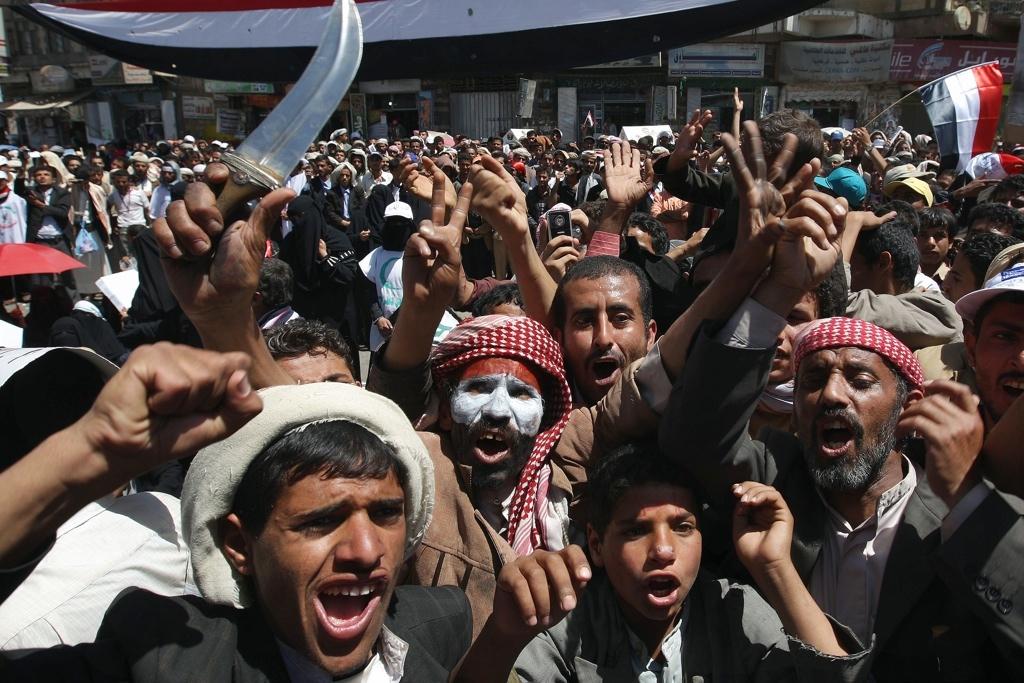Yemen leader may accept opposition plan
Yemeni protesters demonstrate for the ouster of President Ali Abdullah Saleh during a massive anti-regime rally in Sanaa on March 2, 2011.
SANAA, Yemen — Yemeni President Ali Abdullah Saleh may accept a plan designed by political opposition groups that would pave the way for his exit from power and for political reforms to take place, a government spokesman said Thursday as nationwide protests against the president’s rule entered their 20th consecutive day.
"The president's office has received the proposal with favor,” said Mohammed al-Basha, the president’s spokesman, in an interview. “You can expect an answer within 48 hours."
Saleh is now considering the five-point “roadmap” handed to him Wednesday by opposition leaders. The plan would give him until the end of the year to formulate a clear exit strategy. If he accepts the offer, Saleh will be the third major leader to be forced from office this year after Tunisia's Zine El Ben Ali and Egypt's Hosni Mubarak.
The opposition's plan includes changes to the constitution, rewriting election laws to ensure fair representation in parliament, removing Saleh's relatives from leadership positions in the army and security forces, and guaranteeing the right to protest peacefully.
“Saleh has no choice but to accept,” opposition spokesman Mohammed al-Sabry told GlobalPost. “But the plan still needs the approval of the people, in the end they will determine whether he stays or goes.”
Sabry and the opposition coalition are still waiting for an answer from the embattled president, a key U.S. ally who has ruled Yemen, the youngest and most impoverished of the Arab countries, for more than 32 years.
But protest organizers said they feel betrayed by the opposition’s initiative.
“Any deal struck with the opposition is irrelevant to us. We’re not after compromise. We want Saleh to leave now,” said Maher al-Matari, who has been calling for the president to step down for weeks along with thousands of other students camping outside Sanaa University.
As was the case with their counterparts in Egypt and Tunisia, Yemen’s protesters have made the immediate departure of the president and his family the single most important goal of their campaign.
“Saleh is courting the opposition but he should be speaking to us, we are the people who will bring this regime down, not a bunch of politicians,” Matari said.
The scores of protesters stationed outside Sanaa University showed no signs of retreating on Thursday as thousands flocked to hear anti-government speeches delivered by opposition figures and religious leaders.
“The youthful pro-democracy protesters who are not part of this deal are unlikely to be satisfied with it,” said Khaled al-Anasi, a human rights lawyer who is seen by some as a figurehead for the student-led protest movement.
“This agreement may take the wind out of the sails of the opposition parties but it also risks emboldening the people on the streets who will no doubt see the similarities with Egypt,” Anisi said, referring to Mubarak’s promise that he would not run for re-election in September, which failed to appease protesters. Ten days later Mubarak resigned.
A string of concessions from Saleh, including a promise to step down in 2013 and an offer to form a unity government, have so far been unable to mollify the popular unrest here that has spread across Yemen since the resignation of Mubarak last month.
Twenty-seven demonstrators have died since the protests started, according to Amnesty International.
Tens of thousands are camped out in central squares in the capital Sanaa and the southern cities of Aden and Taiz. Yemen’s protesters say they are frustrated with widespread corruption and soaring unemployment in a country where 40 percent of the 23 million people live on $2 a day or less and a third face chronic hunger.
Meanwhile, 65-year-old Saleh, who benefits from millions of dollars in U.S. military aid, expressed regret Wednesday for public statements he made that suggested the United States was behind the unrest in the Arab world.
Saleh told hundreds of students and academics at Sanaa University on Tuesday that there was an "operations room in Tel Aviv with the aim of destabilizing the Arab world." He said the White House ran the operations room.
In a telephone call with John Brennan, U.S. President Barack Obama’s top counterterrorism adviser, Saleh expressed "his regret for misunderstandings related to his public remarks," according to a White House statement.
U.S. officials have urged Saleh to implement political reforms to address the demands of opposition groups but have so far refrained from calling on the leader to step down.
Every day, reporters and producers at The World are hard at work bringing you human-centered news from across the globe. But we can’t do it without you. We need your support to ensure we can continue this work for another year.
Make a gift today, and you’ll help us unlock a matching gift of $67,000!
